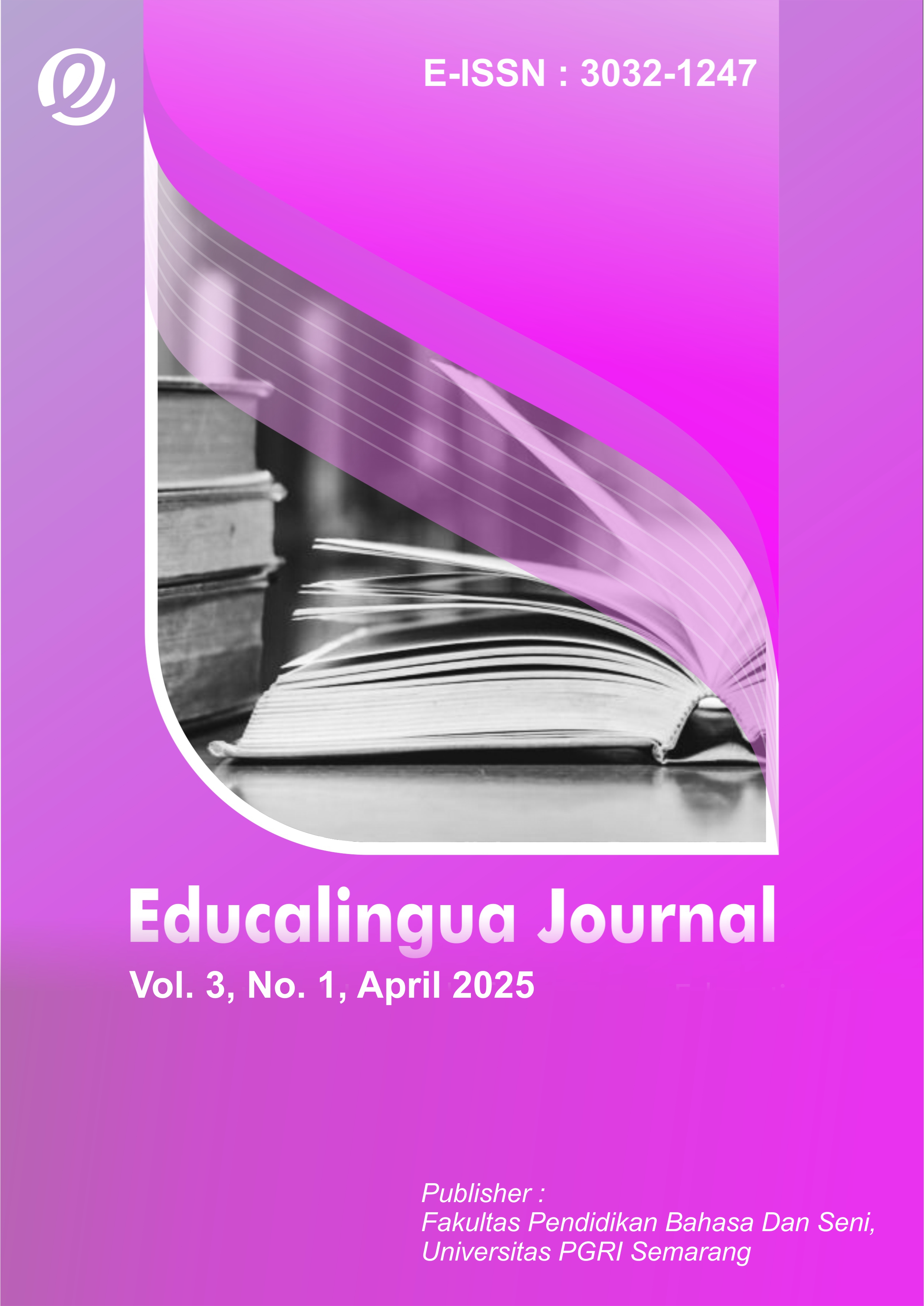Parental Perspectives on Children's Second Language Learning: Insights, Challenges, and Expectations
DOI:
https://doi.org/10.26877/educalingua.v3i1.1863Keywords:
parental perspective, second language learning, second language developmentAbstract
This study investigates how parents support their children's second language (L2) learning in Indonesian bilingual and English-enriched primary schools, using Vygotsky’s Sociocultural Theory and the concept of parental involvement. Involving 27 parents, the research used interviews and observations to explore how their motivations, attitudes, and practices influence children’s L2 development. The findings highlight three key parental roles: motivator, learning facilitator, and resource provider. Most parents showed positive attitudes toward bilingualism and were eager to help their children learn English. However, differences in socioeconomic status, education, and language skills influenced how actively and effectively they could be involved. The study emphasizes the importance of strengthening home-school collaboration and suggests inclusive strategies to help all parents—regardless of background—support their children’s language learning in multilingual contexts.
References
Aji, H. P. A., Widodo, S., Masykuri, E. S., & Nugraeni, I. I. (2023). Students’ problems in building up English vocabulary. English Department Journal, 10(1), 44–58. https://doi.org/10.37729/scripta.v10i1.2353
Al-Hoorie, A. H., Oga-Baldwin, W. Q., Hiver, P., & Vitta, J. P. (2022). Self-determination mini-theories in second language learning: A systematic review of three decades of research. Language Teaching Research. https://doi.org/https://doi.org/10.1177/13621688221102686
Arndt, H. L. (2023). Construction and validation of a questionnaire to study engagement in informal second language learning. Studies in Second Language Acquisition, 45(5), 1456–1480. https://doi.org/10.1017/S0272263122000572
Braun, V., & Clarke, V. (2006). Using thematic analysis in psychology; In qualittaive research in psychology. Uwe Bristol, 3(2), 77–101. https://psychology.ukzn.ac.za/?mdocs-file=1176
Brown, H. D. H. L. (2025). Principles of language learning and teaching a course in second language acquisition seventh edition. Francis and Taylor.
Cabangcala, R. B., Alieto, E. O., Estigoy, E. B., Santos, M. R. D., & Torres, J. M. (2021). When language learning suddenly becomes online: Analyzing English as second language learners’ (ELLs) attitude and technological competence. TESOL International Journal, 16(77), 122–138.
Creswell, J. W. and P. C. N. (2013). Qualitative inquiry & research design: Choosing among five approaches.
Derakhshan, A. (2022). Revisiting research on positive psychology in second and foreign language education: Trends and directions. Language Related Research, 13(5), 1–43. https://doi.org/10.52547/LRR.13.5.1
Dixon, D. H., Dixon, T., & Jordan, E. (2022). Second language (L2) gains through digital game-based language learning (DGBLL): A meta-analysis. Language Learning & Technology, 26(1), 1–25. http://hdl.handle.net/10125/73464
Dovchin, S. (2021). Translanguaging, emotionality, and English as a second language immigrants: Mongolian background women in Australia. TESOL Quarterly, 55(3), 839–865. https://doi.org/10.1002/tesq.3015
Garrote, A., Niederbacher, E., Hofmann, J., Rösti, I., & Neuenschwander, M. P. (2021). Teacher expectations and parental stress during emergency distance learning and their relationship to students’ perception. Frontiers in Psychology, 12(September). https://doi.org/10.3389/fpsyg.2021.712447
Kenny, L., Remington, A., & Pellicano, E. (2024). Everyday executive function issues from the perspectives of autistic adolescents and their parents: Theoretical and empirical implications. Autism. https://doi.org/10.1177/13623613231224093
Lailiyah, M and Wediyantoro, P. L. (2021). Critical thinking in second language learning: Students’ attitudes and beliefs. International Journal of Language Education, 5(3), 180–192. https://doi.org/https://doi.org/10.26858/ijole.v5i3.18350 Critical
Liando, N. V. F., dallyono, R., Tatipang, D. P., & Lengkoan, F. (2023). Among English, Indonesian and local language: Translanguaging practices in an Indonesian EFL classroom. Indonesian Journal of Applied Linguistics, 13(1), 204–216. https://doi.org/10.17509/IJAL.V13I1.58270
López, O. S. (2023). Bilingual competency in U.S. occupations: resetting expectations about language in American society. Humanities and Social Sciences Communications, 10(1), 1–12. https://doi.org/10.1057/s41599-023-01769-w
Mishra, S. B. and A. S. (2017). Handbook of research methodology. Educreation Publishing.
Moybeka, A. M. S., Bosco, F. H., Apalem, C. R., Chandra, D. A., & Efendi, E. (2023). Developing EFL students’ writing ability through contextual teaching and learning (a classroom action research study). Journal of English Culture, Language, Literature and Education, 11(1), 79–97. https://doi.org/10.53682/eclue.v11i1.6107
Nasution, R. F., Manuas, M. J., Ali, M. I., Pabur, H. E., & Tatipang, D. P. (2022). How anxiety affect English achievement?: A correlational study of Indonesian EFL learners. Journal of English Culture, Language, Literature and Education, 10(2), 321–337.
Pawlak, M. (2021). Investigating language learning strategies: Prospects, pitfalls and challenges. Language Teaching Research, 25(5), 817–835. https://doi.org/10.1177/1362168819876156
Purwanto, M. B., Yuliasri, I., Widhiyanto, W., & Rozi, F. (2024). Primary school english education in the age of industry 4.0: tackling challenges, expanding horizons. Proceedings of Fine Arts, Literature, Language, and Education, 859–873.
Rajasekar, S., Philominathan, P., & Chinnathambi, V. (2006). Research methodology. Research Gates, January, 1–53. https://www.researchgate.net/publication/2174858_Research_Methodology
Rasekh Eslami, Z., & Zohoor, S. (2023). Second Language (L2) Pragmatics and Computer Assisted Language Learning (CALL). 1(3), 17.
Reiber-Kuijpers, M., Kral, M., & Meijer, P. (2021). Digital reading in a second or foreign language: A systematic literature review. Computers and Education, 163(December 2020), 104115. https://doi.org/10.1016/j.compedu.2020.104115
Rorintulus, O. A., & Wuntu, C. N. (2023). Exploring the effectiveness of songs for learning improvement: A case of elementary level students’ english skills. Edumaspul: Jurnal Pendidikan, 7(2), 3336–3349. https://doi.org/10.33487/edumaspul.v7i2.6913
Ruan, S., Jiang, L., Xu, Q., Liu, Z., Davis, G. M., Brunskill, E., & Landay, J. A. (2021). Englishbot: an ai-powered conversational system for second language learning. International Conference on Intelligent User Interfaces, Proceedings IUI, 434–444. https://doi.org/10.1145/3397481.3450648
Shao, K., Stockinger, K., Marsh, H. W., & Pekrun, R. (2023). Applying control-value theory for examining multiple emotions in L2 classrooms: Validating the achievement emotions questionnaire –second language learning. Sage Journals. https://doi.org/https://doi.org/10.1177/13621688221144497
Uccelli, P. (2023). Midadolescents’ language learning at school: Toward more just and scientifically rigorous practices in research and education. Language Learning, 73(January 2023), 182–221. https://doi.org/10.1111/lang.12558
Umiera Hashim, H., Md Yunus, M., & Norman, H. (2021). English as secondary language learning and autism spectrum disorder: the obstacles in teaching and learning the language. Arab World English Journal, 12(2), 22–30. https://doi.org/10.24093/awej/vol12no2.2
Vitta, J. P., & Al-Hoorie, A. H. (2023). The flipped classroom in second language learning: A meta-analysis. Language Teaching Research, 27(5), 1268–1292. https://doi.org/10.1177/1362168820981403
Yu, B. (2023). Self-regulated learning: A key factor in the effectiveness of online learning for second language learners. Frontiers in Psychology, 13(January), 1–6. https://doi.org/10.3389/fpsyg.2022.1051349
Zhao, Y. and, & Chun, L. (2008). Technology and second language learning: Promises and problems. Taylor and Francis.








